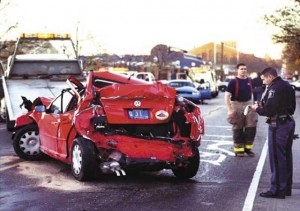
Millennials can't live without their cars, but aren't prepared for what happens when their car is being repaired after an accident.
For so long it was thought that millennials were content to lives without cars, and now it appears they cannot live without them.
A new study shows that half of millennials would rather give up social media for a week than go without their cars. Additionally, 41% would give up an hour of sleep each day and 39% would skip a meal before giving up their vehicles.
Enterprise, the rental car company, polled millennials to determine how strongly they felt about the possibility of going without a car for an extended period of time, such as if it were in for repair. What the company discovered is that millennials are just like most folks: they feel they need their vehicles.
“It turns out that drivers would go to great extremes to maintain access to a vehicle,” said Mary Mahoney, vice president North American insurance replacement division for Enterprise.
(Not buckling up in back? You’re putting everyone at risk. For the story, Click Here.)
Some of the other insights revealed by the survey include:
- More than half of millennials (52%) admit that if they lost access to their vehicle for an extended period of time, they’d be forced to beg their friends and family members for rides
- Nearly half (49%) of millennials say the ability to drive to work is the thing they value most about having access to a vehicle
- More than one-third (34%) of U.S. drivers say they drive an average of three to four places per day
- If they had to borrow a friend or family member’s car for an extended period of time, 51% said they would feel “awkward” while 35% said they’d be “anxious”
- Men (12%) were nearly twice as likely as women (7%) to indicate that driving a friend or family member’s car over an extended period of time would make them “angry”
- Women (39%) were significantly more likely than men (28%) to indicate that driving a friend or family member’s car would make them “anxious”
(Click Here to see why teens are three times more likely to die in car crashes.)
The study was conducted as part of a campaign to promote awareness of what could happen if drivers in that age group were involved in an accident that required them to be without a vehicle for an extended period of time.
“Many drivers might not know it, but if they’re involved in one of the millions of auto accidents per year and their car needs to be repaired, the average repair time is two weeks,” Mahoney said.
The research showed that most were unsure if their insurance provided rental car coverage. Only 32% indicated that they are “very confident” that they are aware of everything in their auto insurance policies, and fewer than four in 10 say they are familiar with the term “rental reimbursement coverage.”
(Millennials favor practical cars over luxury models. Click Here for the story.)
In addition, more than half of U.S. drivers (53%) say they do not read their entire policy before purchasing auto insurance. In the case of rental car reimbursement coverage, this can prove particularly problematic, because it’s typically an add-on feature not included in most standard policies.
